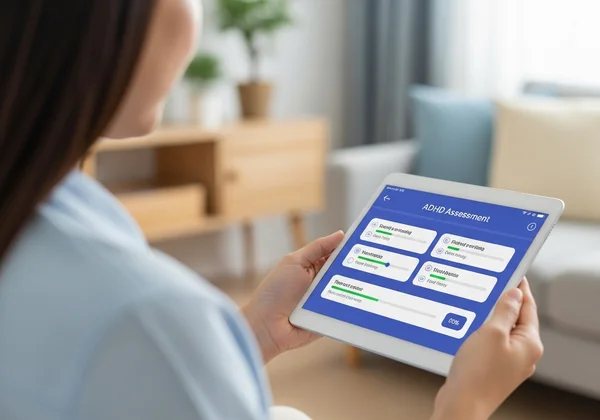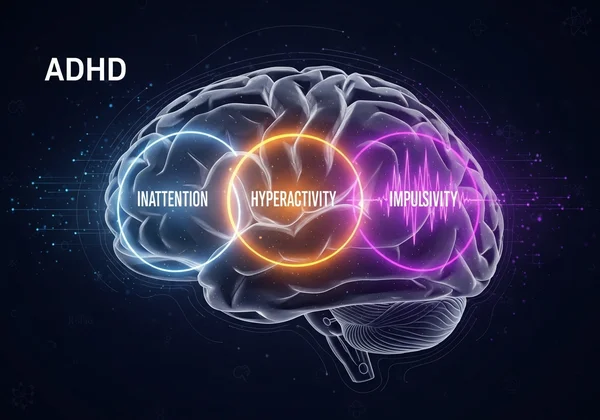ADHD Symptoms: Signs to Consider a Free Online Test
Are you constantly distracted, feeling restless, or struggling with impulsivity? Many adults and parents wonder if what they're experiencing or observing in their children might be ADHD. Do I have ADHD? This guide will help you understand the common signs and symptoms across different age groups, offering clarity and helping you determine your next steps. Recognizing these signs is the first step toward seeking understanding and support, and a great way to start is by taking a confidential online ADHD test. If you're ready to explore this possibility, consider using a reliable screening tool to begin your journey to clarity. Start your assessment.

Understanding Core ADHD Symptoms
At its heart, Attention-Deficit/Hyperactivity Disorder (ADHD) involves persistent patterns of inattention, hyperactivity, and impulsivity that interfere with daily functioning or development. According to the Centers for Disease Control and Prevention (CDC), these are not just occasional moments but pervasive behaviors. Understanding these ADHD symptoms is crucial for anyone wondering if they or a loved one might be affected.
Inattention: Distraction, Forgetfulness, and Focus Issues
Inattention often manifests as difficulty sustaining attention on tasks or play activities. Individuals might frequently lose things necessary for tasks, seem not to listen when spoken to directly, or struggle with organization. They might also easily be distracted by external stimuli or unrelated thoughts, leading to forgetfulness in daily activities. This can make completing tasks, following instructions, or managing time feel like an uphill battle. The struggle with focus issues can impact academics, work, and even social interactions.
Hyperactivity: Restlessness, Fidgeting, and Excessive Talk
Hyperactivity is more commonly associated with children but can persist into adulthood, albeit sometimes presenting differently. In kids, it might look like constant fidgeting, running, or climbing excessively in situations where it's inappropriate. For adults, this often translates into an internal sense of restlessness, difficulty engaging in quiet activities, or excessive talk. They might feel driven by a motor, constantly needing to be on the go or engaging in nervous habits.
Impulsivity: Hasty Decisions and Emotional Reactions
Impulsivity involves making hasty decisions without considering the consequences, often leading to interruptions, impatience, or difficulty waiting their turn. This can also manifest in significant emotional reactions that seem disproportionate to the situation, such as quick temper flares or difficulty regulating intense feelings. Such behaviors can strain relationships and lead to regrettable actions, making daily life unpredictable.
ADHD Symptoms in Adults
While ADHD is typically diagnosed in childhood, adult ADHD symptoms are increasingly recognized. Many adults with ADHD were never diagnosed as children, their symptoms perhaps overlooked or attributed to other issues like anxiety or depression. The manifestations in adults can be more subtle than in children.
How Adult ADHD Manifests in Daily Life & Work
In adults, ADHD can deeply affect daily life and work. You might find yourself struggling with chronic disorganization, difficulty managing time, or persistent procrastination. Tasks requiring sustained mental effort can be particularly challenging. Forgetfulness regarding appointments or commitments is common. In the workplace, this might translate to difficulty meeting deadlines, frequent job changes, or underperformance despite high intelligence. Relationships can also be impacted by forgetfulness, impatience, or emotional dysregulation. Many adults report a feeling of being constantly overwhelmed or "behind."

Common Misconceptions About Adult ADHD
One common misconception is that adult ADHD is just an excuse for laziness or poor time management. This is untrue; it's a neurodevelopmental condition. Another myth is that ADHD only involves hyperactivity. Many adults, particularly women, primarily experience inattentive ADHD symptoms and may not display overt hyperactivity, leading to misdiagnosis or late diagnosis. Understanding these nuances is vital. A free online ADHD test can help illuminate these signs.
Recognizing ADHD in Children & Teens
For parents, recognizing ADHD in children and teens can be challenging, as some behaviors are common in all kids. However, when these behaviors are severe, persistent, and impact multiple settings (school, home, social), it's worth considering ADHD.
Behavioral Signs of ADHD in Younger Kids
In younger children, behavioral signs of ADHD are often more overt. This can include excessive running or climbing, difficulty playing quietly, constant fidgeting, or talking excessively. They might blurt out answers before questions are finished, interrupt games, or struggle to wait their turn. These behaviors are not just occasional mischief but a consistent pattern that can be disruptive in classrooms and family settings. Observing these consistent patterns is key.
Academic & Social Impact on School-Aged Children
For school-aged children, ADHD often significantly impacts their academic and social life. They might struggle to stay seated in class, complete homework assignments, or follow multi-step instructions. This can lead to lower grades despite their potential. Socially, they might have trouble making or keeping friends due to impulsivity, interrupting others, or difficulty with social cues. These challenges aren't due to a lack of effort but are a direct result of their ADHD symptoms. A thorough ADHD screening test could be a helpful first step for concerned parents.

The Three Main Types of ADHD
ADHD isn't a single condition but presents in different ways, categorized into three main types of ADHD, based on which symptoms are most prominent.

Predominantly Inattentive Presentation (Formerly "ADD")
Individuals with the Predominantly Inattentive Presentation primarily exhibit symptoms of inattention. They might struggle with organization, focus, and memory but show little to no signs of hyperactivity or impulsivity. This type was once known as "ADD" (Attention-Deficit Disorder) and is often harder to spot, especially in quiet, compliant children or adults, as their struggles might be internalized. They might be perceived as daydreamy or unmotivated rather than having a neurological difference.
Predominantly Hyperactive-Impulsive Presentation
This presentation is characterized by prominent symptoms of hyperactivity and impulsivity, with less significant issues related to inattention. Children might be constantly on the go, fidgeting, and talking excessively. Adults might feel an intense internal restlessness, struggle with waiting, or make impulsive decisions. These behaviors are often more noticeable to others, leading to earlier identification, though it's still possible for this type to go undiagnosed.
Combined Presentation
The Combined Presentation is the most common type of ADHD. Individuals with this presentation exhibit a significant number of symptoms across all three core areas: inattention, hyperactivity, and impulsivity. Their challenges are multifaceted, affecting various aspects of their lives. This comprehensive overlap often leads to more noticeable difficulties in daily functioning, making the symptoms harder to miss than in the other two presentations. Understanding these types can offer a clearer picture.
When to Consider an Online ADHD Screening Test
If reading about these symptoms resonates with your experiences or those of someone you care about, you might be wondering, "Is there a test for ADHD?" An online ADHD test can be an excellent initial step to gain preliminary insights. It's a convenient and confidential way to explore potential ADHD traits from the comfort of your home.
Your Self-Assessment: Is It Time to Investigate More Deeply?
Considering a self-assessment is a proactive step. If you've found yourself nodding along to many of the symptom descriptions, whether for yourself or a child, it might be time to investigate more deeply. An ADHD self assessment test can provide a structured way to reflect on your experiences. It's about gathering information to help you decide if professional evaluation is something to pursue. Take a moment to consider if your current struggles are impacting your happiness, relationships, or productivity.
What an Online Screening Can & Cannot Do
It's crucial to understand what an online screening tool, like the one found on our platform, can and cannot do. An online ADHD screening test is a valuable initial step. to help you identify if your experiences align with common ADHD traits. You receive an AI-driven report that provides personalized insights and a general score. However, it's not a diagnostic tool. Only a qualified healthcare professional can provide an official ADHD diagnosis. Think of it as a helpful guide that can inform your conversations with doctors. It's designed to provide guidance, not definitive answers, and is a great free online ADHD test for adults and children.

Taking the First Step Towards Clarity
Understanding ADHD symptoms is the beginning of a journey toward greater self-awareness and potentially, better management strategies. Whether you're a questioning adult or a concerned parent, knowing the signs can empower you to take meaningful action.
If you suspect you or a loved one might have ADHD, don't let uncertainty hold you back. Taking a reliable online screening is a safe, private, and accessible way to get a clearer picture of your or your child's potential traits. It provides a personalized report that can serve as a valuable starting point for discussions with a healthcare professional.
Ready to take the first step towards clarity and gain valuable insights? Take our free ADHD test now and empower yourself with knowledge.
Frequently Asked questions About ADHD Symptoms & Screening
Do I have ADHD if I experience these symptoms?
Experiencing some ADHD symptoms doesn't automatically mean you have ADHD. Many symptoms, like occasional distraction or restlessness, are common in everyone. However, if these symptoms are persistent, severe, and negatively impact multiple areas of your life (e.g., work, school, relationships) across various settings, it's worth exploring further. An online screening tool, such as the one available on our site, can help you determine if your symptom pattern aligns with common ADHD traits and if further investigation is warranted. Discover your results.
What are the main differences between adult and child ADHD symptoms?
While the core underlying issues of inattention, hyperactivity, and impulsivity remain, their expression often differs. Children with ADHD frequently exhibit more overt hyperactivity, like excessive running or climbing, and impulsivity through blurting out answers. Adults often experience a more internalized restlessness, and their inattention might manifest as chronic disorganization or procrastination rather than visible fidgeting. Adult ADHD test questions often focus on workplace performance, relationships, and time management, which are areas frequently impacted in adults.
Is an online ADHD symptom test accurate?
An online ADHD symptom test provides a reliable screening based on established criteria, offering a strong indication of whether you exhibit traits consistent with ADHD. It is designed to be highly accurate as a preliminary assessment. However, it is not a diagnostic tool. For an official diagnosis, you need to consult with a qualified healthcare professional, such as a psychiatrist, psychologist, or neurologist. Our free online ADHD test is designed to be a comprehensive and confidential first step. Try our free tool today.
What should I do after taking an online ADHD symptom screener?
After taking an online ADHD screening test and receiving your personalized report, the next important step is to review your results carefully. If the report indicates potential ADHD traits, consider scheduling an appointment with a healthcare professional (like your primary care doctor, a psychologist, or a psychiatrist) to discuss your findings. Your report can be a helpful starting point for this conversation. Remember, the online test is a guide to inform your next steps toward professional evaluation and support.